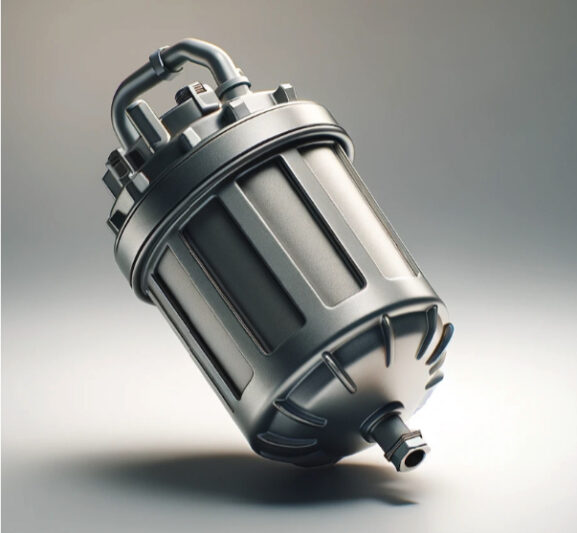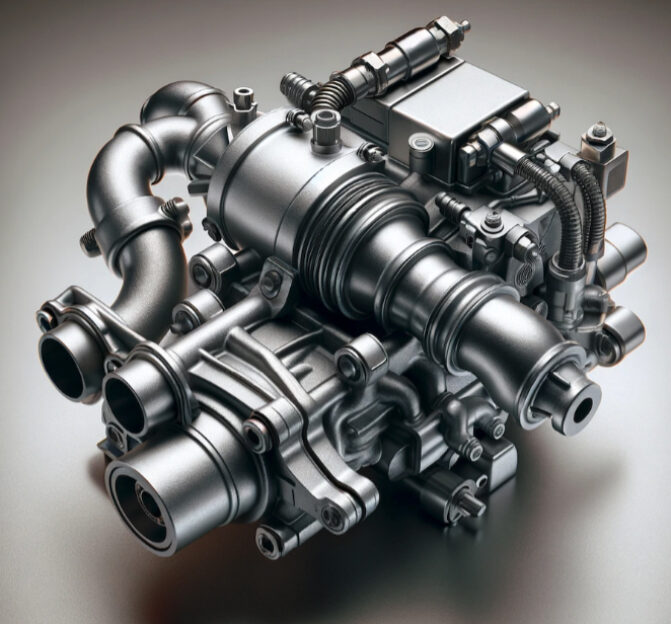In today’s diesel vehicles, engine efficiency and performance depend on many factors, including proper operation of the fuel filter, EGR valves, and intake manifolds. Troubleshooting these systems can significantly improve your vehicle’s performance and reduce fuel consumption. In this article, we’ll look at the common symptoms and problems associated with clogged diesel fuel filters, as well as the impact of EGR valves and intake manifolds on vehicle performance. We will also provide practical advice on how to replace and maintain them.
A clogged diesel fuel filter can manifest itself with a variety of symptoms, including deterioration in engine traction and power, increased fuel consumption, erratic idling, and even sudden engine stalling. These signs often occur because a clogged filter cannot effectively clean impurities from the fuel, resulting in poor combustion and consequent poor performance. Regular inspection and timely filter replacement is key to keeping your diesel engine running efficiently and reliably.
Changing the diesel filter is an important part of vehicle maintenance to help keep your engine running optimally. Car manufacturers generally recommend changing the filter every 15,000-30,000 kilometers, but this can vary depending on operating conditions and fuel quality. Changing the filter regularly helps prevent problems such as reduced power, starting problems and increased fuel consumption, as well as protecting the fuel system from wear and damage.
Identifying a clogged diesel fuel filter can be tricky, as the symptoms are often similar to other engine problems such as faults in the fuel pump or injection system. However, a clogged filter usually manifests itself through reduced power and increased fuel consumption. It is advisable to consult a professional for an accurate diagnosis. To avoid mistakes, it is important to check and replace the filter regularly and perform a comprehensive diagnosis when symptoms arise.
A clogged diesel fuel filter can lead to serious consequences for the engine. Restricted fuel flow impairs combustion, which can cause reduced power, increased fuel consumption and even damage to engine components due to incomplete combustion. In extreme cases, it can lead to failure of the fuel pump and injection system, requiring costly repairs. Regular maintenance and timely filter replacement help prevent these problems and ensure the longevity and reliability of the diesel engine.
Choosing the right diesel fuel filter is critical to maintaining engine health. The type and model of the vehicle, as well as the operating conditions, must be considered. Quality filters ensure that the fuel is better able to remove water and impurities from the fuel for optimum engine performance. Using filters recommended by the vehicle manufacturer ensures compatibility and efficiency. Poor quality or inappropriate filters can clog quickly or ineffectively clean fuel, resulting in poor performance and possible engine damage. Most vehicles have two fuel filters, each playing a different role in cleaning the fuel and maintaining engine health.

Changing the diesel fuel filter is a process that can be carried out by yourself or at a car service centre, replace the fuel filter is a key element of diesel engine maintenance that helps to keep the engine running at a high level.
It is necessary to first switch off the engine and de-energise the fuel system. Then you should carefully disconnect the filter, removing all connected hoses and fasteners. The new filter is installed in place of the old one, ensuring proper connection of all elements. Once installed, it is important to check the system for leaks and make sure the engine is running properly. Changing the filter regularly helps maintain the efficiency of the fuel system and prevents many engine problems.
When replacing the diesel fuel filter, it is important to perform additional checks to ensure the entire fuel system is reliable. All fuel lines and connections should be inspected for cracks, wear, or leaks. It is also important to check for water in the fuel, as it can cause serious engine problems. Checking fuel pressure and fuel pump performance is also recommended to ensure optimal engine performance. These steps help detect and correct potential problems before they lead to more serious consequences.
EGR (Exhaust Gas Recirculation) valves play an important role in reducing pollutant emissions and improving the efficiency of diesel engines. They redirect some of the exhaust gases back into the combustion chamber, which reduces the combustion temperature and the amount of nitrogen oxides produced. While this improves environmental performance, it can also lead to soot build-up in the intake manifold and on the valves, which requires regular maintenance. A malfunctioning or clogged EGR valve can lead to poor performance and increased fuel consumption.
Intake manifolds in diesel engines play a key role in distributing air to the cylinders. Proper intake manifold function ensures even mixing of air and fuel, which is important for efficient combustion. Clogged intake manifolds can lead to poor performance, increased fuel consumption and reduced power. Regular cleaning and maintenance of the intake manifold can help maintain optimal engine performance and prevent potential problems.
Regular maintenance of the EGR valves and intake manifolds in diesel vehicles is essential to maintain their performance and efficiency. Such maintenance includes cleaning soot and dirt build-up, which prevents performance degradation and increased fuel consumption. In addition, regular inspection and cleaning of these components helps reduce the risk of costly malfunctions and extend engine life. Efficient EGR valves and clean intake manifolds ensure better combustion, helping to improve fuel economy and reduce emissions. Find out more about EGR valves with AUTODOC to supplement information on how they work and how their effective maintenance can improve your vehicle’s performance.
Understanding the importance and function of the diesel fuel filter, EGR valves and intake manifolds is key to maintaining the efficiency and reliability of your diesel vehicle. Regular maintenance of these components and fixing any issues in a timely manner helps ensure cleaner combustion, lower emissions, and optimal performance. Remember, keeping your vehicle in good condition not only contributes to fuel economy and lower emissions, but also helps prevent costly repairs in the future.




